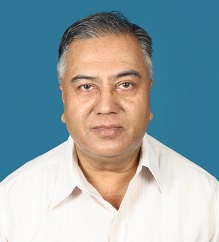
Prof. M.D. Srinivas is a theoretical physicist by training. After obtaining his PhD from the University of Rochester, U.S.A., he taught at the Department of Theoretical Physics, University of Madras, during 1976-96. His research work in Theoretical Physics has been mainly in the fields of quantum optics and the conceptual and mathematical foundations of quantum mechanics. Since 1996, Prof. Srinivas has been working as a Senior Fellow at the Centre for Policy Studies, Chennai, which is devoted to study of Indian civilizational ideas and institutions in diverse fields of public activity, and exploration of the potential of these ideas and institutions in alleviating the current situation of India.
Since 1980, Prof. Srinivas has been engaged in a study of the Indian tradition of sciences and technologies, with the conviction that drawing upon our civilizational resources would contribute significantly to making our current efforts in science and technology more creative and relevant. In particular, he has worked on various aspects of Indian tradition of mathematics and astronomy and also on the logical and epistemological foundations of Indian sciences. Prof. Srinivas has also been keen that Indian scientific and technological tradition should form an integral part of the study and research conducted in our institutions of higher learning. Together with Profs. M.S. Sriram and K. Ramasubramanian, he recorded a set of 40 lectures on “Development of Mathematics in India from Vedic Times to the Modern Period” under the NPTEL programme of IIT Madras, which can be used as resource material for an introductory course on Indian Mathematics at the Undergraduate level. The videos and the slides of these lectures can be accessed at http://nptel.ac.in/courses/111101080/.
Abstract of the lecture: Pan-Indian Traditions of Science and Technology
Background
Apart from the ancient traditions of Egypt and Mesopotamia, the historians of science and technology have identified three major non-Western traditions of science and technology which flourished at least till late eighteenth century: the Indian, Chinese and the Islamic traditions. The Indian and the Chinese civilisations had unbroken tradition of sciences and technologies starting from the ancient period, which enabled India and China to be the leading economic powers in the world for nearly two millennia.
The history of sciences and technologies of China has been systematically documented and studied by both Western and the Chinese scholars. While one does not see any divergence of scholarly opinion regarding the pan-Chinese nature of their sciences and technologies — nor do we find any such difference of opinion on the pan-European nature of European sciences and technologies in the medieval and modern periods — the modern scholarship of the last two centuries has largely ignored and even denied the civilizational unity of India, while highlighting its various manifestations at regional and sub-cultural levels. This has of course been refuted by our great nationalist leaders and thinkers such as Mahatma Gandhi who declared in 1909in his seminal work Hind Swaraj:
The English have taught us that we were not one nation before, and that it will require centuries before we become one nation. This is without foundation. We were one nation before they came to India. One thought inspired us. Our mode of life was the same. It was because we were one nation that they were able to establish one kingdom. … far-seeing ancestors of ours … saw that India was one undivided land so made by nature. They, therefore, argued that it must be one nation. Arguing thus, they established holy places in various parts of India, and fired the people with an idea of nationality in a manner unknown in other parts of the world.
Pan-Indian Knowledge Systems of India
It is indeed unfortunate that Independent India is yet to reorganize the colonial system of education so as to give due importance to the study, research and teaching of Indian sciences, technologies and other knowledge systems and practises — many of which survive and even flourish today albeit without any state support and patronage. Still, thanks to the dedicated and largely voluntary efforts of a number of scholars in the last seventy years, we have a much better comprehension today of the concepts, techniques and methodologies of our sciences and other knowledge systems, their historical development as well as significant achievements. As a result, we do have a corpus of published source-works and other historical evidences which shed considerable light on the pan-Indian nature of the sciences and knowledge systems of India and on the various mechanisms that facilitated and strengthened the civilizational unity of India and its knowledge systems. During the course of this lecture, we shall try and illustrate the above statement with a few examples drawn from the history of Indian tradition of linguistics, mathematics, astronomy and medicine.
Reading
MD Srinivas & JK Bajaj, “Indian Tradition in Science and Technology, an overview”.